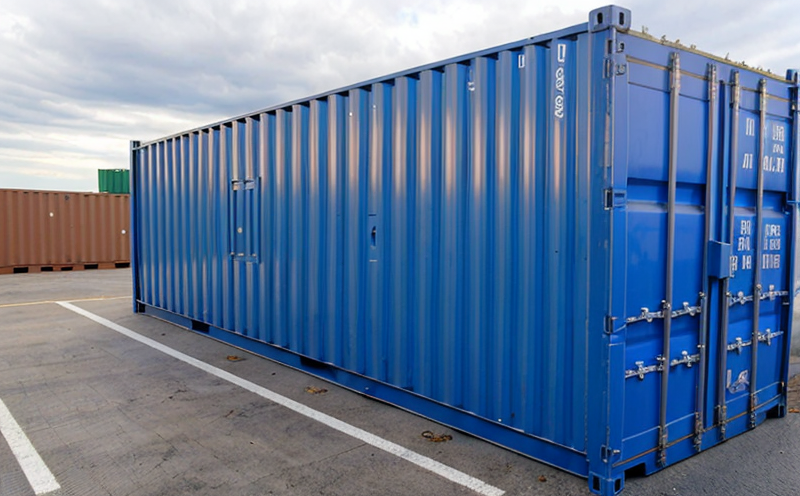Storage & Container Plastics Testing
In the realm of polymer and plastics testing, storage and container plastics testing plays a crucial role in ensuring that plastic containers meet stringent quality standards for durability, safety, and performance. Quality managers, compliance officers, R&D engineers, and procurement specialists rely on this testing to verify that materials used in packaging and storage are fit for purpose across various industries.
Storage and container plastics testing involves evaluating the physical properties of plastic containers under conditions similar to those they will encounter during their lifecycle—from manufacturing through distribution, use, and disposal. The primary focus is ensuring that these containers can withstand environmental stresses such as temperature fluctuations, chemical exposure, mechanical stress, and biological contaminants without degrading or compromising product integrity.
The testing protocols are designed to mimic real-world scenarios, allowing manufacturers to identify potential weaknesses early in the development process. This approach helps prevent costly recalls and ensures compliance with international standards like ISO 17774-2 for thermoplastic containers used in food packaging.
For quality managers and R&D engineers, understanding the specific tests involved is essential. Common tests include impact resistance, tensile strength, flexibility, permeability, chemical compatibility, and biodegradability assessments. These metrics are critical when designing storage solutions that can handle diverse loads while maintaining structural integrity over extended periods.
Compliance officers must ensure their products meet regulatory requirements set forth by governing bodies worldwide. Testing labs accredited to perform these evaluations provide assurance that results align with industry expectations. For instance, the European Union's REACH regulations mandate rigorous testing for materials used in packaging intended for consumer goods.
Purchasing departments benefit from thorough storage and container plastics tests because they help identify reliable suppliers who can deliver consistent quality across batches. By investing time upfront to validate supplier capabilities through comprehensive testing programs, organizations reduce risks associated with supply chain disruptions or substandard components.
Scope and Methodology
The scope of storage and container plastics testing encompasses several key areas aimed at ensuring the reliability and safety of plastic containers:
- Type Testing: Evaluates a sample batch to determine whether it conforms to specified requirements.
- Type Examination: Reviews design documentation, manufacturing processes, raw materials, and quality control measures to assess compliance with relevant standards.
- Type Approval: Grants formal certification confirming that the product meets all necessary criteria for use in specific applications.
The methodology typically involves a series of steps tailored to each type of test. These may include:
- Sample preparation: Ensuring samples are representative and free from contamination.
- Environmental conditioning: Adjusting temperature, humidity, or other variables to simulate actual storage conditions.
- Instrumentation setup: Configuring testing equipment such as tensile testers, impact machines, and permeability analyzers according to specified protocols.
- Data collection: Recording measurements and observations during each test run.
Testing laboratories employ state-of-the-art facilities equipped with advanced measurement tools to ensure accurate results. This includes sophisticated software for data analysis and reporting that allows for easy interpretation of findings by stakeholders involved in decision-making processes.
International Acceptance and Recognition
- ISO 17774-2: This standard covers the physical properties of thermoplastic containers used in food packaging, including impact resistance and tensile strength.
- ASTM D638: Specifies procedures for determining tensile properties of plastics. Widely recognized across North America.
- EN 12704: Provides guidelines for the design and testing of plastic containers used in pharmaceutical packaging.
Laboratories accredited to perform these tests hold certificates validating their adherence to international standards, which adds credibility when presenting results to clients or regulatory bodies. Laboratories like ours maintain memberships with recognized organizations such as ASTM International and ISO, ensuring continuous alignment with evolving best practices.
| Standard | Description |
|---|---|
| ISO 17774-2 | Tensile properties of thermoplastic containers used in food packaging. |
| ASTM D638 | Tensile properties of plastics (North American standard). |
| EN 12704 | Design and testing guidelines for plastic containers in pharmaceutical packaging. |
Use Cases and Application Examples
- Food Packaging: Ensuring containers retain their integrity when exposed to various food types, including acidic or salty products.
- Beverage Containers: Evaluating how well containers protect beverages from UV light degradation while maintaining flavor integrity.
- Liquid Storage: Assessing the ability of containers to contain volatile liquids without leakage or contamination.
The following table illustrates some real-world applications where storage and container plastics testing is particularly important:
| Application | Main Concerns |
|---|---|
| Food Packaging | Leakage, contamination, and shelf life. |
| Beverage Containers | Flavor retention, UV degradation resistance. |
| Liquid Storage | Vapor lock prevention, chemical compatibility. |





